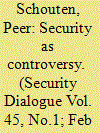|
|
|
Sort Order |
|
|
|
Items / Page
|
|
|
|
|
|
|
| Srl | Item |
| 1 |
ID:
177946


|
|
|
|
|
| Summary/Abstract |
In this article, we show how Annemarie Mol's notion of ontological politics helps to open up the research agenda for cyber security in Critical Security Studies. The article hence seeks to further the debate about STS and Critical Security Studies. The article's main claim is that the concept of ontological politics enables an engagement with the complex and transformative dynamics of ICT and the new security actors and practices that shape security politics in the digital age. By examining the virulent attacks executed by the Mirai botnet – one of the world's largest, fiercest, and most enduring botnets – we point to four aspects of cyber security that attention to the ontological politics of cyber security attunes us to: the proliferation and entanglement of security agencies, actors, sites, and spaces. These aspects of cyber security, we argue, are becoming increasingly prominent alongside the development of the Internet of Things (IoT) and 5G network technology. In conclusion, we discuss the wider security theoretical and normative-democratic implications of an engagement with the ontological politics of security by exploring three avenues for additional conversation between ontological politics and Critical Security Studies.
|
|
|
|
|
|
|
|
|
|
|
|
|
|
|
|
| 2 |
ID:
127802


|
|
|
|
|
| Publication |
2014.
|
| Summary/Abstract |
Critical approaches to security have come to define themselves against mainstream security studies by not a priori assuming what security is, but rather taking it as an 'essentially contested concept'. Yet, as evidenced by the way in which recent 'turns' in the field have played out in the debate around airport security, ontological assumptions about security tend to restrict the scope of empirical analysis, with airport security being studied as, for instance, either discourse or practice. This article aims to propose an alternative methodological approach to security by studying security as controversy. Studying security as controversy means refraining from making a priori assumptions about the ontology of (in)security, instead considering it as itself at stake in - and hence the outcome of - security governance efforts. The article elaborates on this approach by drawing on core insights from actor-network theory, a conceptual and methodological toolkit that allows, as I show, a focus on how security actors perform security by enrolling, assembling and translating heterogeneous elements into stable assemblages that can be presented as definitive security solutions or threats. The article illustrates this approach through a look at the case of airport security at Amsterdam Airport in the aftermath of the 2009 Christmas terrorist attempt.
|
|
|
|
|
|
|
|
|
|
|
|
|
|
|
|
|
|
|
|
|